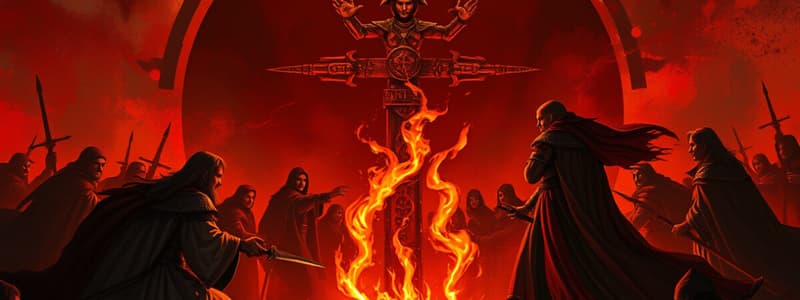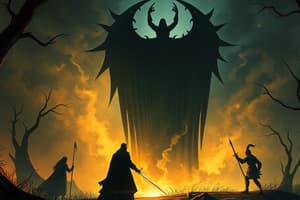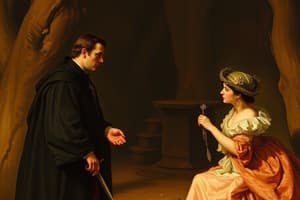Podcast
Questions and Answers
What does Macbeth learn about the fate of Fleance after Banquo's murder?
What does Macbeth learn about the fate of Fleance after Banquo's murder?
- Fleance escaped and poses no immediate threat. (correct)
- Fleance is in hiding and cannot be found.
- Fleance will return for revenge soon.
- Fleance is dead.
How does Lady Macbeth react to Macbeth's outburst during the feast?
How does Lady Macbeth react to Macbeth's outburst during the feast?
- She is supportive and encourages him to express his feelings.
- She asks him to confront the ghost directly.
- She faints from shock at his actions.
- She dismisses his behavior as a childhood condition. (correct)
What does the reappearance of Banquo's ghost signify for Macbeth?
What does the reappearance of Banquo's ghost signify for Macbeth?
- His guilt over murders is manifesting mentally. (correct)
- He is losing his grip on reality.
- His ambition has led to madness.
- He is experiencing divine punishment.
What does Macbeth imply when he states, 'Blood will have blood'?
What does Macbeth imply when he states, 'Blood will have blood'?
How does Macbeth's view of reality change as the play progresses?
How does Macbeth's view of reality change as the play progresses?
What decision does Macbeth make at the end of the excerpt regarding his future?
What decision does Macbeth make at the end of the excerpt regarding his future?
What impact does Macbeth's ambition have on his character development in this scenario?
What impact does Macbeth's ambition have on his character development in this scenario?
What reaction do the thanes have to Macbeth's behavior during the feast?
What reaction do the thanes have to Macbeth's behavior during the feast?
Flashcards are hidden until you start studying
Study Notes
Macbeth's Feast and Banquo's Ghost
- Macbeth welcomes the lords to the feast, showcasing his position, but is confronted by the news of Banquo's murder.
- Fleance, Banquo's son, escapes his father's fate, leaving Macbeth momentarily reassured yet aware of his lost control over destiny.
- Lady Macbeth calls Macbeth back to the feast, indicating her role in maintaining appearances and social order.
Vision of Guilt
- Macbeth encounters Banquo's ghost at the table, a manifestation of his guilt and paranoia that only he can perceive.
- This moment raises questions about the nature of reality versus madness, emphasizing Macbeth's psychological unraveling due to ambition and guilt.
Impact on Relationships
- Lady Macbeth attempts to normalize Macbeth's behavior by attributing it to childhood fits, reflecting her desperation to maintain power and manage the narrative.
- Macbeth’s erratic behavior astonishes the other thanes, highlighting his isolation and the strain on their relationships due to shared secrets.
The Deepening Despair
- Macbeth's rambling about murders demonstrates his mental instability and the heavy burden of guilt from their violent actions.
- The ghost’s reappearance signifies Macbeth's deep-seated fears and moral decay, as he cannot separate the supernatural from reality.
Lady Macbeth’s Shift
- Frustrated with Macbeth’s behavior, Lady Macbeth realizes that their deceit is futile and opts for isolation, prompting the guests to leave.
- Macbeth reflects on the consequences of their violent path, asserting that "Blood will have blood," indicating the inevitability of retribution.
Macbeth's Path Forward
- The absence of Macduff at court unsettles Macbeth, prompting him to seek knowledge from the weird sisters to understand his fate.
- Macbeth acknowledges his commitment to violence, claiming he is "stepped in so far" that retreat is impossible, illustrating the depth of his moral decline and desperation to retain power.
- The theme of ambition and its destructive consequences looms large, as Macbeth realizes he has sacrificed everything for his quest for authority.
Studying That Suits You
Use AI to generate personalized quizzes and flashcards to suit your learning preferences.




